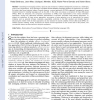Free Online Productivity Tools
i2Speak
i2Symbol
i2OCR
iTex2Img
iWeb2Print
iWeb2Shot
i2Type
iPdf2Split
iPdf2Merge
i2Bopomofo
i2Arabic
i2Style
i2Image
i2PDF
iLatex2Rtf
Sci2ools
145
click to vote
TSE
2010
2010
A Comparison of Six UML-Based Languages for Software Process Modeling
— Describing and managing activities, resources and constraints of software development processes is a challenging goal for many organizations. A first generation of Software Process Modeling Languages (SPMLs) has appeared in the nineties but failed to gain broad industrial support. Recently however, a second generation of SPMLs appeared, leveraging the strong industrial interest for modeling languages such as the UML. In this article, we propose a comparison of these UML-based SPMLs. While not exhaustive, this comparison concentrates on SPMLs most representative of the various alternative approaches, ranging from UML-based framework specializations to full-blown executable meta-modeling approaches. To support the comparison of these various approaches, we propose a frame gathering a set of requirements for process modeling, such as semantic richness, modularity, executability, conformity to the UML standard, and formality. Beyond discussing the relative merits of these approaches, w...
Related Content
| Added | 31 Jan 2011 |
| Updated | 31 Jan 2011 |
| Type | Journal |
| Year | 2010 |
| Where | TSE |
| Authors | Reda Bendraou, Jean-Marc Jézéquel, Marie-Pierre Gervais, Xavier Blanc |
Comments (0)

